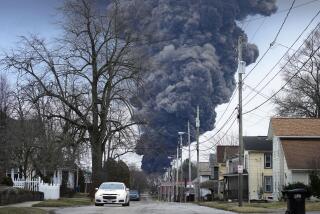Government of India Sues Union Carbide on Bhopal Plant Disaster
- Share via
NEW YORK — The government of India on Monday filed suit against Union Carbide, alleging that the company was negligent in the Bhopal chemical leak last December that killed 1,700 people and injured hundreds of thousands more.
The accident, the civil lawsuit contends, doomed thousands of victims to “agonizing, lingering and excruciating deaths.” Survivors “experienced an unimaginable and unforgettable catastrophe, witnessing the virtual destruction of their entire world.”
The lawsuit asks for unspecified actual and punitive damages against Danbury, Conn.-based Union Carbide, which owns 50.9% of the plant in partnership with the Indian government.
The filing in U.S. District Court in Manhattan may set off a complex legal imbroglio over who has the right to represent the Bhopal victims in American courts.
Although the Indian government enacted a law Feb. 20 establishing itself as the victims’ chief legal representative, lawyers throughout the United States have filed more than 40 private lawsuits, asking a combined $17 billion in damages on behalf of more than 150,000 victims. Those suits have been consolidated in federal court here.
Challenge to Indian Law
The plaintiffs’ lawyers are scheduled to meet April 16 with U.S. District Judge John F. Keenan, who is presiding over the litigation.
Many of those lawyers believe that the Indian government has been trying to seize the legal initiative, potentially depriving them of millions of dollars in fees. A group representing almost all of those attorneys challenged the constitutionality of the Indian law Monday with a petition filed in New Delhi.
The Indian government is also continuing to negotiate with Union Carbide and the company’s insurance carriers over a settlement of the Bhopal claims. As a result, some of the private attorneys said they regard Monday’s filing as a maneuver aimed at giving the Indian government the standing in federal court to ask for dismissal of the private lawsuits if they come to stand in the way of a settlement with Union Carbide.
“They know Union Carbide won’t sign a settlement if there are any private lawsuits still outstanding,” said Jerry S. Cohen, a Washington lawyer who serves as co-chairman of a lawyers’ committee overseeing the private lawsuits. “It’s very Machiavellian. I’m not about to let the Indian government take away my clients.”
Not ‘Null and Void’
But others believe that the government’s action suggests that it is willing to cooperate with the American lawyers.
“They’re not suggesting that representation (of the victims) by private counsel is in any way null and void,” said Stanley M. Chesley of Cincinnati, Cohen’s co-chairman. “Hopefully, we’ll be able to cooperate.”
The Indian government is represented in the suit by the Minneapolis firm of Robins, Zelle, Larson & Kaplan. Attorneys from the firm were unavailable for comment.
For their part, Union Carbide spokesmen treated the lawsuit Monday as an impediment to a settlement.
“I’ve long thought that, if they brought a lawsuit, it would be ill advised,” said Bud Holman, a New York attorney representing the company in all of the Bhopal liability cases. “In this case, the victims would benefit more from negotiation than litigation. Hearing there’s a lawsuit, I take it they’ve decided not to settle.”
The Bhopal disaster struck Dec. 3, when a cloud of methyl isocyanate gas wafted over neighborhoods adjoining Union Carbide’s plant. The gas attacks the respiratory system, the eyes and mucous membranes, and the lack of adequate warning, safety provisions and medical care in the densely settled neighborhoods made the cloud lethal. Although the death toll has been estimated as high as 2,500, the lawsuit set the official figure at 1,700 dead.
Subsequent investigations indicated that the cloud was produced when a tankful of the compound, known as MIC and used to manufacture pesticides, became contaminated by water and vaporized.
In its complaint, the Indian government contends that Union Carbide--a “monolithic multinational” whose power is “neither restricted by national boundaries nor effectively controlled by international law,” breached its duty to operate a safe plant by installing defective equipment and condoning hazardous practices.
Among other allegations, the complaint asserts that the company “recommended, encouraged, and permitted storing MIC in dangerously large quantities.”
The MIC tanks were not equipped with adequate alarms or working gas “scrubbers” to filter hazardous vapors, and Union Carbide had not distributed information regarding medical treatment of persons exposed to the gas, the complaint continues.
Furthermore, the government alleges, the company failed to disclose a Sept. 10, 1984, safety survey of the Bhopal installation’s sister plant in Institute, W.Va., “which acknowledged that a runaway reaction in MIC storage tanks could occur.”
Union Carbide declined through its spokesmen to respond to the individual charges.
More to Read
Sign up for Essential California
The most important California stories and recommendations in your inbox every morning.
You may occasionally receive promotional content from the Los Angeles Times.










